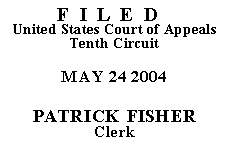

| UNITED STATES OF AMERICA, |
No. 03-3209 (D.C. No. 02-CR-20054-CM) (Kansas) |
A hearing was held on the motion to suppress, and the response thereto, at which time two agents of the Federal Bureau of Investigation testified. The defendant also testified. At the conclusion of the hearing, the district court denied the motion to suppress from the bench, holding that both of the defendant's "consents" were voluntarily given, and that, all things considered, the search, or searches, did not exceed the scope of the consents.
Subsequent thereto the defendant, pursuant to a plea agreement, entered a conditional plea of guilty, reserving his right to obtain appellate review of the district court's denial of his motion to suppress. Fed. R. Crim. P. 11(a)(2). Defendant was thereafter sentenced to 27 months imprisonment. On appeal, the only issue raised is whether the district court erred in denying the defendant's motion to suppress. According to counsel, the totality of the evidence showed that the defendant's "consents" one oral and one written were both involuntary and, alternatively, that the scope of either consent was exceeded by the actual search. We disagree and affirm.
When reviewing a district court's denial of a motion to suppress, this court accepts the district court's factual findings unless they are clearly erroneous, viewing the evidence in the light most favorable to the government. See United States v. Basham, 268 F.3d 1199, 1203 (10th Cir. 2001). This court reviews de novo the legal question of whether a search violated the defendant's Fourth Amendment rights. Id.
Our reading of the transcript of the hearing held on the motion to suppress convinces us that the district court's findings of fact are not clearly erroneous and, de novo, we conclude there was no violation of the defendant's Fourth Amendment rights.
Judgment affirmed.
Entered for the Court,
Robert H. McWilliams
Senior Circuit Judge
*. This order and judgment is not binding precedent, except under the doctrines of law of the case, res judicata, and collateral estoppel. The court generally disfavors the citation of orders and judgments; nevertheless, an order and judgment may be cited under the terms and conditions of 10th Cir. R. 36.3.
1.In upholding an Ohio statute prohibiting the possession of child pornography, the Supreme Court explained the rationale behind penalizing those who possess images of child pornography. "[I]n order to protect the victims of child pornography, it hopes to destroy a market for the exploitative use of children. . . . It is also surely reasonable for the State to conclude that it will decrease the production of child pornography if it penalizes those who possess and view the product, thereby decreasing demand." Osborne v. Ohio, 495 U.S. 103, 109 (1990).